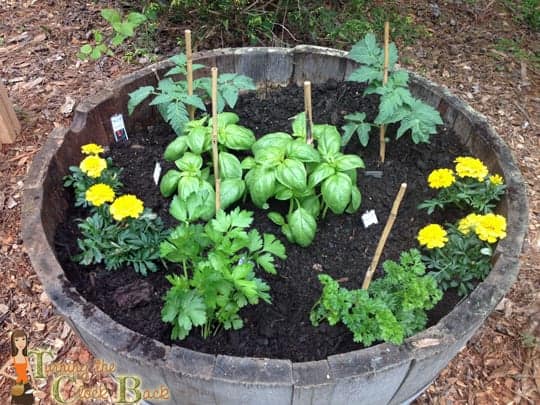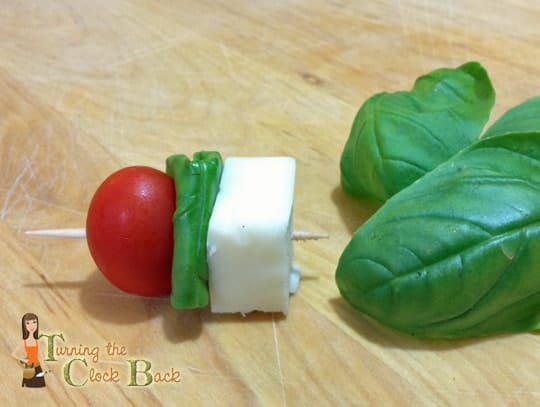This post on how to grow an organic garden is sponsored by Home Depot but all opinions expressed are my own.
Want to start an organic vegetable garden in the back yard? From natural soil amendments to organic pest control methods, organic gardening can be rewarding but challenging. Here are a few tips for starting an organic garden project this spring.

Table of Contents
When Should You Start Your Organic Garden Project?
Here in Georgia, our summer planting season starts around mid to late April so we have a fairly long growing season. In fact, we have multiple growing seasons here in the Atlanta area.
Cool weather plants can be planted in February, summer plants go in around late April and then we can also plant in late August for a fall crop. Needless to say, I find myself quite busy maintaining an organic garden for 6 to 8 months every year.
I have learned a few tips over the years, although I am far from an expert. I tend to be a really great planter but only a so-so harvester! There are a lot of factors involved in maintaining an organic garden and sometimes Mother Nature just doesn’t cooperate.
The best time to start your organic garden project is right now. Even if that happens to be fall! Check out my post on things to plant in November if you don’t believe me. If it is the middle of winter, start a garden journal of all your ideas. Once the weather warms up, you can start preparing your garden bed for spring. Then, when the chance of frost has passed, you can start planting.

✯Don’t want to miss the next post?✯
Follow Turning the Clock Back on Facebook | Twitter | Pinterest
Or join the private Facebook group for simple tips on going green!
Preparing Your Organic Garden Beds
Over the last month or so I have been cleaning up old beds, building new ones, and planning where everything is going to go. I ordered several organic plants from Home Depot that included many varieties of herbs, tomatoes and peppers.
These plants were put into a combination of organic garden soil, mushroom compost and cow manure. My beds consist of everything from prefabricated raised beds made from cedar wood to whiskey barrels planters and even a bed made from cinder blocks. Plants aren’t picky…as long as they have soil, water and sunlight they will grow! Everything else is just aesthetic.

Buying Organic Garden Plants
I was really impressed with the quality of the plants that were shipped to me from The Home Depot. I have never ordered live plants online before and wasn’t sure what to expect. Learning how to grow an organic garden isn’t easy and starting from seed makes it even more challenging. I, personally, prefer to start with actual plants.
They arrived with the soil still damp, a small stake in each pot to keep them upright and a plastic bag around each plant. Plenty of packing material inside gave it a nice amount of cushioning and after unpacking I let them adjust to our local climate by leaving them in the driveway in a partially sunny spot for 2 days before planting.

Simple Garden Planting Tips
After the plants were acclimated a bit, I took everything out to the back yard for planting. Since my beds were already prepared all I needed was a small garden trowel to dig the holes for planting my organic garden.
I tried to make sure the tallest plants (typically the tomatoes) were in the back of the bed and the shorter plants like the herbs and peppers were in the front. Some of the plants I purchased from The Home Depot are actually perennial here in Georgia, meaning they will come back year after year.
I prefer to put perennials in my landscaping rather than a garden bed that will be tilled up every year. So, the chives and mint were placed along my rock wall to act as both food AND decor! I love foodscaping with edible plants!
Like this post on how to grow an organic garden? Try these gardening tips, too:
- 10 Foods That Control Pests Naturally and Improve Soil Health : These 10 foods right from your kitchen pantry help repel pests, boost soil nutrients, and support an organic garden naturally.
- 5 Edible Flowers for Your Backyard Garden: Edible flowers are a great way to add a burst of color to your food. A bright yellow blossom in your salad or a soft purple bud on your soup can really make your meal visually appealing.
- How to Plant a Teabag Garden: Using old teabags is a great way to start your seeds. Check out the post to learn more.

Tips for Maintaining Your Organic Garden
After everything in my organic garden was planted and watered I was pretty much done for the day. However, maintaining an organic garden is something you need to remember to do several times a week. If you would like more information on my organic garden, check out the video I put together with a brief chat about how the process went. Stop by in a couple weeks for another update on how the organic garden is doing as the weather starts to heat up!
Here is a basic guideline for maintaining your organic garden once the plants are already in the ground:Visually inspect your plants often:
Are they dropping leaves? Do you see evidence of bugs? There is no real need to pluck off dead leaves but if you see bugs on your plants pick them off by hand if possible and drop them in a bowl of soapy water. For large scale infestations, choose an organic insecticide like Neem Oil. Thankfully the bugs haven’t found my organic garden YET!
Check the soil moisture:
Different plants like a different amount of water but a general guideline is to water every 3 days or so. Water directly at the roots and make sure to really soak the soil well. Give the soil some time to dry out a little bit before watering again so you do not end up with rotten plant roots.
Fertilize as needed:
Typically if you plant in a well nourished soil you should not have to feed your plants for the first 6 weeks or so. I like to plant in soil that has been tilled with compost and manure and then use an organic fertilizer when they are reaching full size and starting to produce flowers and food.
Harvest regularly:
If you are going to put all that effort into growing your own organic garden it is wasteful to let your food rot on the vine! Take a basket outside with you daily and pick whatever is ripe.
Don’t worry if you don’t have enough for a meal! I tend to put together ‘vegetable trays’ with 12 string beans, 8 cherry tomatoes, 1 pepper, etc. This allows me to create something edible out of bits and pieces of my garden’s harvest.
Herbs can be harvested just about every day for use in cooking without damaging the plants. One of my favorite ways to use fresh basil is to make Caprese on a stick:

Growing Organic Takes TIME
Since my tomato plants aren’t producing fruit yet, I had to buy organic ones from the grocery store but I love that I can pick just a few herbs whenever I need them to add to my recipes. Fresh herbs are incredibly expensive at the grocery store and it is much more convenient to have them growing in the back yard.
So far I am very happy with the organic garden plants I received from The Home Depot and they are really thriving in my backyard. We have had a very wet and cool spring and I have already lost a few of my other garden plants to root rot but the Bonnie Organic plants I put in seem to be lush and green and really doing very well. Have patience and tend to your garden regularly and let me know how your organic garden turns out!

Diane is a professional blogger and nationally certified pharmacy technician at Good Pill Pharmacy. She earned her BS in Microbiology at the University of New Hampshire and has worked in cancer research, academics, and biotechnology. Concern over the growing incidence of human disease and the birth of her children led her to begin living a more natural life. She quickly realized that the information she was learning along the way could be beneficial to many others and started blogging and freelance writing to share this knowledge with others. Learn more about her HERE.

Love it! Because of my surprise pregnancy my garden only consists of a few tomato plants on my porch right now. I am hoping to get a few others planted soon. And love that you can order organic plants from Home Depot!
Pregnancy does tend to slow down productivity a bit! Parsley is easy and requires very little work and I am having good luck with my herb garden. Congrats on the soon to be new addition!
Your plants look great! We planted seeds and we are still eagerly waiting for them to be big enough to enjoy!
I am terribly with starting plants from seed. I do a few like cucumbers and radishes and a few others but most I just shell out the money for the plant. I am impatient!
How fun, I love the update. I am not sure we will do a garden this year because of the extreme heat, last year was terrible. If I do, I love the idea of an organic garden!!
Your garden looks amazing!! I need to get to it and start planting again. Our two beds in the back are empty and I know they could be filled with squash and tomatoes by now!
Your garden looks great! We are doing ours this week too!
That looks great, Diane! So fresh and green! Great tips too. Last year, we had some tomatoes but kept forgetting to pick them. It doesn’t do any good if the vegetables go bad!
agreed! I usually have way too many herbs to use myself but I have found several neighbors that appreciate them!
We had a really wet and cool spring so far and some of the other plants haven’t survived. The eggplant particularly are about dead but I keep babying them and crossing my fingers!
Your garden looks beautiful! It is so nice that you have so many months of gardening throughout the year. Not so lucky here in Illinois. We have a raised vegetable garden and over the past two years I have been adding our compost to, as well as organic soil and manure. I will have to look at the mushroom compost too! I love all your tips – they are very helpful!
Glad I could help. Gardening here in GA does pose a number of challenges sometimes. Heat, bugs, disease….it is a battle but I enjoy it most of the time!